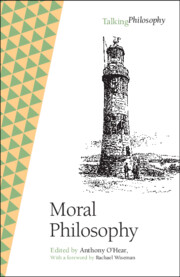Book contents
- Moral Philosophy
- Talking Philosophy
- Moral Philosophy
- Copyright page
- Contents
- Foreword
- Preface
- List of Contributors
- Rationality and Goodness
- Acting well
- Apprehending Human Form
- Does Modern Moral Philosophy Rest on a Mistake?
- Absolutes and Particulars
- On the So-called Logic of Practical Inference
- Absolute Prohibitions without Divine Promises
- Moral Obligation
- The Lesser Evil
- The Ethics of Co-operation in Wrongdoing
- Authority
- The Force of Numbers
- Reason, Intention, and Choice
- Modern Moral Philosophy and the Problem of Relevant Descriptions
- Index
The Lesser Evil
Published online by Cambridge University Press: 19 May 2022
- Moral Philosophy
- Talking Philosophy
- Moral Philosophy
- Copyright page
- Contents
- Foreword
- Preface
- List of Contributors
- Rationality and Goodness
- Acting well
- Apprehending Human Form
- Does Modern Moral Philosophy Rest on a Mistake?
- Absolutes and Particulars
- On the So-called Logic of Practical Inference
- Absolute Prohibitions without Divine Promises
- Moral Obligation
- The Lesser Evil
- The Ethics of Co-operation in Wrongdoing
- Authority
- The Force of Numbers
- Reason, Intention, and Choice
- Modern Moral Philosophy and the Problem of Relevant Descriptions
- Index
Summary
‘The Russian Revolution and the National Socialist ascendancy in Germany are the two most important sources of evidence of moral philosophy in our time, as the French Revolution was for Hegel and Marx, and later to Tocqueville and for Mill. Although both revolutions produced, both in intention and in effect, a triumph on a gigantic scale, there are often remarked differences between the evil effects planned and achieved.’ This is an observation made by Stuart Hampshire, a keen philosophical connoisseur of the 20th century.1
- Type
- Chapter
- Information
- Moral Philosophy , pp. 289 - 312Publisher: Cambridge University PressPrint publication year: 2022

